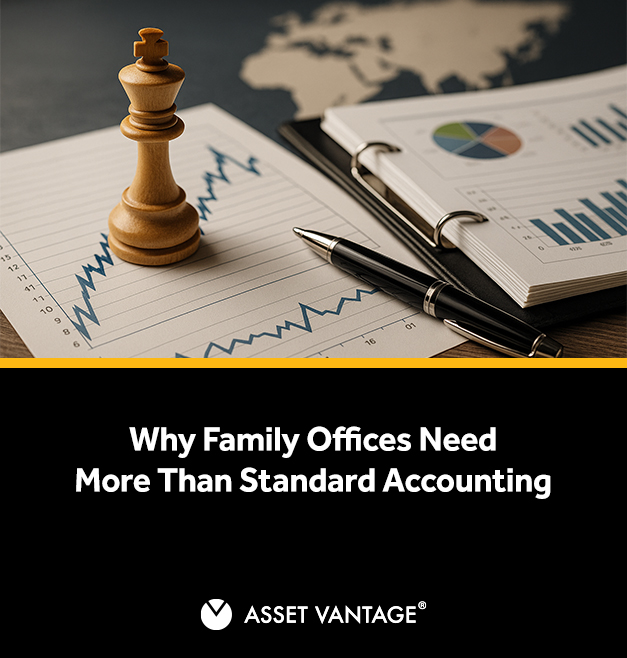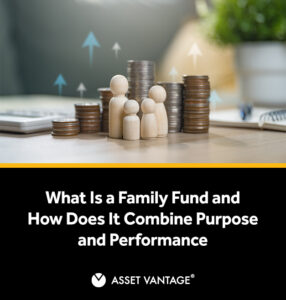Read Time8 Mins
- Why Family Offices Need More Than Standard Accounting
- The Role of a Family Office CPA
- Family Office CPA vs Other Wealth Professionals
- Single vs Multi-Family Office CPA Models
- When High Net Worth Families Should Add a CPA
- Benefits of Having a Family Office CPA
- Cost Considerations and Value Delivered
- Questions to Ask Before Hiring a CPA
Why Family Offices Need More Than Standard Accounting
Family offices manage far more than routine bookkeeping. A family’s financial assets span investments, real estate, operating companies, and lifestyle costs. Standard accountants track transactions, but they rarely integrate these into a cohesive picture of the family’s financial lives.
A family office CPA bridges this gap. They design internal controls, oversee tax compliance, and create governance structures that keep complex entities both efficient and compliant. Their role extends beyond accounting:
- Strategic planning: Aligning reporting with long-term objectives such as succession planning and legacy planning.
- Compliance oversight: Ensuring compliance across multiple jurisdictions and asset types.
- Decision support: Providing timely analysis so wealth advisors and investment managers can act with confidence.
The difference is measurable. In a 2024 Family Office Exchange survey, 72% of single-family offices with in-house CPAs reported fewer compliance breaches and faster decision cycles than those relying solely on external accountants.
This combination of technical rigor and strategic foresight is why family offices provide CPAs a central seat at the table. Without them, families risk fragmented reporting, tax exposure, and governance blind spots.
The Role of a Family Office CPA
A family office CPA provides specialized services that extend far beyond a standard accountant’s remit. Their role combines technical rigor with strategic foresight, ensuring that a family office structure can sustain wealth, governance, and legacy across generations.
Strategic Tax Planning and Compliance
Family office CPAs design sophisticated tax planning strategies. They minimize liabilities, navigate multi-jurisdictional rules, and embed controls for ensuring compliance. Their oversight reduces tax exposure and keeps the family’s financial assets aligned with regulatory standards.
Financial Reporting and Statements Oversight
Beyond preparing financial statements, CPAs monitor internal controls and supervise performance reporting. This level of financial management supports investment managers and wealth advisors with reliable data to make timely, informed decisions.
Cash Management and Bill Pay
CPAs oversee liquidity, reconcile accounts, and manage bill pay processes. These tasks, often overlooked in standard accounting, become central in safeguarding long-term objectives by ensuring liquidity matches both investment management and lifestyle spending.
Estate Planning and Succession Support
Working closely with estate attorneys, CPAs integrate estate planning, succession planning, and legacy planning into the family office structure. This coordination strengthens governance structures and provides continuity for future generations.
Lifestyle Management and Customized Solutions
Family offices offer personalized services that often extend to lifestyle management. From household accounting to private aviation oversight, CPAs deliver a personalized approach that reflects the family’s unique priorities while maintaining accuracy and control.
According to the 2023 Campden Wealth Global Family Office Report, over 65% of family offices rank in-house CPAs as essential for managing tax compliance and multi-asset reporting, citing reduced errors and stronger governance as measurable outcomes.
Family Office CPA vs Other Wealth Professionals
A family office CPA does not replace other advisors. Instead, they anchor the accounting and compliance function that keeps a family office structure stable. Comparing their role with that of other wealth professionals clarifies when their presence becomes essential.
CPAs vs Wealth Managers and Advisors
Wealth managers focus on investment management and market strategy. Their role is to grow capital. A family office CPA ensures compliance, risk management, and financial reporting. Together, they deliver strategic financial planning that balances growth with governance. For high-net-worth individuals, this partnership fosters a deep understanding of both opportunities and risks.
CPAs vs Their Traditional Role
Traditional accounting centers on filings, bookkeeping, and tax forms. For family offices, this remit is too narrow. A family office CPA must become a wealth custodian who manages governance, philanthropy, and multigenerational planning. Integrated accounting and investment platforms enable this shift, helping CPAs move beyond compliance and guide families to make informed decisions on complex wealth structures.
CPAs vs Private Banks
Private banks offer credit, custody, and investment products. Their model is product-driven and often standardized. Family office CPAs, by contrast, integrate family office services into a broader framework of compliance, reporting, and risk control. Clients value the personalized approach, where liquidity, estate planning, and succession are managed with long-term objectives in mind.
| Role | What They Do | What They Don’t Do | Where a Family Office CPA Adds Value |
|---|---|---|---|
| Wealth Managers & Advisors | Provide investment management, portfolio strategy, and market access. | Oversee tax compliance, internal controls, or financial reporting. | Deliver strategic financial planning that ensures investments align with compliance and governance structures. |
| Standard Accountants | Handle business filings, payroll, and personal returns. | Integrate the family’s financial lives into one view or plan for succession and philanthropy. | Act as senior managers of financial oversight, offering tailored solutions for a family’s specific priorities. |
| Private Banks | Offer credit, custody, and packaged investment products. | Customize services to reflect long-term objectives or legacy planning. | Provide family office services with a deep understanding of clients, from liquidity and estate planning to succession continuity. |
Single vs Multi-Family Office CPA Models
Family offices vary in how they structure CPA oversight. The right model depends on the scale of wealth, the complexity of assets, and the family’s long-term objectives.
Single Family Office with Dedicated CPAs
A single-family office serving a single lineage often employs a dedicated team of CPAs. They work directly with family members to safeguard the family’s financial assets, design governance structures, and ensure compliance. For wealthy families with significant estates, this hands-on approach provides customized solutions across the broad spectrum of financial lives — from succession planning to philanthropy.
Multi-Family Office CPA Services
Multi-family offices support several high-net-worth individuals under one platform. CPAs in this model deliver family office services at scale, combining tax compliance, financial reporting, and estate management. Clients gain access to investment advice and wealth management oversight without bearing the cost of a dedicated team. This structure strikes a balance between efficiency and depth, while still providing a tailored framework for each family.
Outsourced vs In-House CPA Models
Every family must decide whether to build CPA capacity internally or outsource to trusted advisors. In-house CPAs offer direct control and alignment with long-term objectives. Outsourced models provide flexibility and cost savings, particularly for clients with less complex structures. Both options reinforce the role of CPAs as senior managers of oversight, keeping wealth strategies compliant and connected across generations.
| Model | Who It Serves | What It Provides | Limitations | Best For |
|---|---|---|---|---|
| Single Family Office with Dedicated CPAs | One family, usually with significant wealth | Hands-on approach with CPAs managing the family’s financial assets, governance structures, and compliance | High fixed cost; requires senior manager oversight | Wealthy families with complex estates and a broad spectrum of financial lives |
| Multi-Family Office CPA Services | Multiple high-net-worth individuals sharing infrastructure | Scaled family office services, including tax compliance, financial reporting, estate, and investment advice | Less customized; may share resources across clients | Families seeking wealth management with cost efficiency |
| Outsourced vs In-House CPA Models | Depends on the structure chosen | In-house offers direct control and alignment with long-term objectives; outsourced provides flexibility and tailored solutions. | Outsourced may lack deep integration; in-house requires significant investment. | Families deciding between control and cost savings |
When High Net Worth Families Should Add a CPA
Deciding when to bring a CPA into the family office structure is not about wealth alone. It is about complexity. A family office CPA becomes essential when financial lives span multiple entities, asset classes, and jurisdictions. At that point, standard accountants or advisors cannot provide full oversight.
Threshold of Complexity
High-net-worth families and multigenerational families often reach this point when investments diversify across real estate, operating businesses, and cross-border portfolios. Managing the family’s financial assets without a CPA risks fragmented reporting and exposure to compliance failures.
Unique Challenges That Trigger CPA Needs
Certain milestones demand specialized tax services and oversight. Liquidity from a business sale, professional athletes with cross-border contracts, or large philanthropic initiatives all create unique challenges. A family office CPA provides cost-effective ways to integrate planning and reporting without gaps. For multiple families operating within a multi-family office, CPAs ensure consistent frameworks while still adapting to each family’s specific priorities.
Ensuring Compliance and Risk Management
CPAs reduce cyber risk, strengthen governance structures, and ensure compliance in ways standard advisors cannot. Unlike wealth managers who focus on investment growth, CPAs safeguard continuity and control. They give families confidence that strategies for wealth, succession, and governance remain future-ready.
Benefits of Having a Family Office CPA
The value of a family office CPA lies in connecting technical accounting skills with strategic oversight. They ensure that family office services extend beyond administration into a framework that protects wealth, strengthens governance, and prepares for the future.
Holistic Approach to Wealth Preservation
Family office CPAs integrate accounting, financial planning, and estate management into a holistic approach that safeguards the family’s financial assets. Whether in a single- or multi-family office structure, their oversight ensures accurate reporting, aligned strategies, and achievable long-term objectives.
Strategic Planning and Informed Decisions
A family office CPA ensures that financial management is not only about today’s balance sheets. Their insights help families align wealth management with governance structures, allowing high-net-worth individuals to make informed decisions across a broad spectrum of investments. This includes everything from cash management to investment advice that reflects the family’s specific needs.
Trusted Advisor Role
More than technicians, CPAs act as trusted advisors. They guide succession planning, legacy preservation, and compliance in ways that standard accountants cannot. Clients value their ability to ensure compliance while adapting family office services to changing priorities. By linking financial lives to strategic goals, CPAs give families clarity and continuity across generations.
Cost Considerations and Value Delivered
Hiring CPAs within family office structures comes at a cost, but the value lies in minimizing tax liabilities, ensuring compliance, and protecting family wealth across generations. Yet for high-net-worth individuals, the cost must be weighed against the outcomes.
What families pay for:
- Compensation for experienced CPAs and their support staff
- Accounting technology and reporting systems
- The overhead of maintaining an in-house function
What families receive in return:
- Tax efficiency: specialized tax planning and reporting that minimizes liabilities
- Compliance strength: governance structures and reporting that ensure compliance across jurisdictions
- Risk reduction: lower likelihood of penalties or gaps in oversight
- Wealth protection: safeguarding the family’s financial assets across generation
In a multi-family office, CPAs deliver many of the same benefits in a cost-effective way:
- Shared resources reduce overhead
- Families still access accurate reporting and tailored advice
- Family office services remain comprehensive without the full expense of a dedicated team
For clients comparing options, the trade-off is clear. A family office CPA may require investment, but the value lies in continuity, control, and confidence that strategies align with long-term objectives.
Questions to Ask Before Hiring a CPA
Hiring a CPA for a family office is a strategic choice. Beyond technical expertise, families need someone who can safeguard wealth, strengthen governance, and guide long-term objectives. The right questions reveal both capability and alignment with the family’s priorities.
Key questions to consider:
- Do they have experience with tax regulations affecting high-net-worth families and multigenerational structures?
- Can they integrate estate planning, risk management, and family governance into their approach?
- How do they work with other advisors — wealth managers, estate planning attorneys, investment advisors?
- Do they provide a holistic view of the family’s financial lives or just compliance-focused accounting?
- Can they offer customized solutions that align with the family’s values, philanthropic goals, and long-term objectives?
- What role will they play in succession planning and legacy preservation?
- Have they supported both single-family and multi-family office structures, and can they adapt as complexity grows?
- How do they demonstrate value to clients through reporting, transparency, and measurable outcomes?
- Can they design governance structures and internal controls that ensure compliance across jurisdictions?
- How do they respond to unique triggers such as business sales, cross-border income, or liquidity events?
Standard accounting ends at reporting. A family office CPA goes further, weaving tax planning, compliance, governance, and strategic oversight into one framework. For high-net-worth families, that difference determines whether wealth remains vulnerable or endures across generations.
The decision is not about cost alone. It is about value: minimizing tax liabilities, ensuring compliance, protecting the family’s financial assets, and aligning financial lives with long-term objectives. Whether through a single-family, multi-family, or outsourced model, the right CPA partner delivers clarity, continuity, and confidence.
When family wealth reaches a level of complexity that standard advisors cannot manage, a family office CPA is no longer optional; it is essential.







